by Nancy Jaffer | May 6, 2021
One of the world’s greatest international horse shows, presented by the Royal Dublin Society, has been knocked out by the Covid situation for the second year in a row.
“The RDS has been monitoring the evolving situation regarding Covid-19, including the vaccination rates and the latest Government advice. In the current circumstances it has been decided that it will not be possible to operate a Dublin Horse Show this year,” said a statement from the RDS.
“Preparations for a typical Dublin Horse Show take many months of planning and organization, and this has not been possible this year with the levels of uncertainty that still exist around the re-opening of Irish society.”
It is both fiscal and sporting blow, since the show has been estimated to be worth 50 million Euros to the Irish economy.
The showgrounds will not be entirely dark, if the government approves a national show offered behind closed doors (without spectators) that has been proposed for the international’s five-day slot Aug. 18-22.
Entry to the event will be restricted to equestrian competitors for the day of their competition only,as the RDS “is mindful of acting responsibly during these times.”
The RDS statement continued: “Our desire to host the RDS National Championships, despite the exceptionally challenging circumstances, is motivated by our commitment to support the sport horse industry during this very difficult time. We would like to acknowledge and thank the ongoing support of our sponsors, who are crucial to the viability of the Dublin Horse Show, as well as the understanding of the equestrian community for whom the Show is a yearly highlight.
“We look forward to hosting the Dublin Horse Show in 2022 and welcoming tens of thousands of visitors back each day to a summer staple that people have known and loved for generations.”
The proposed schedule would feature;young horse in hand classes, ponies, amateur jumpers, children’s jumpers and classes for young jumpers up to 9 years old.
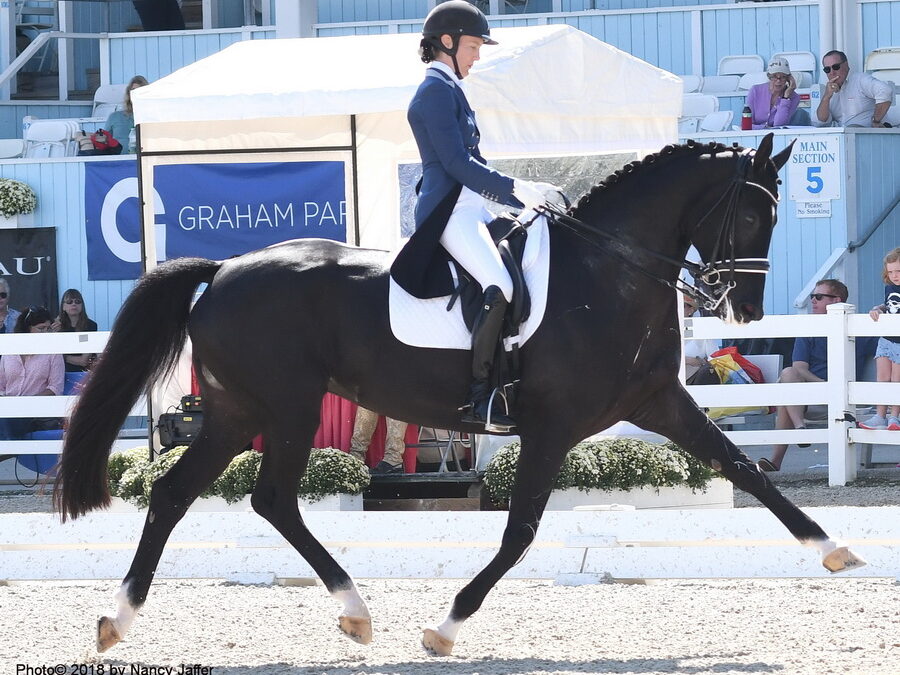
by Nancy Jaffer | May 3, 2021
She was meant to be an eventing horse, or perhaps go out in the hunt field. But once Candescent’s potential was glimpsed by Alice Tarjan, it was obvious that neither of those destinies would be in the mare’s future.
The four-year-old Hanoverian Alice imported from Europe after viewing a videotape obviously was going to be a dressage horse, her new owner realized almost immediately.
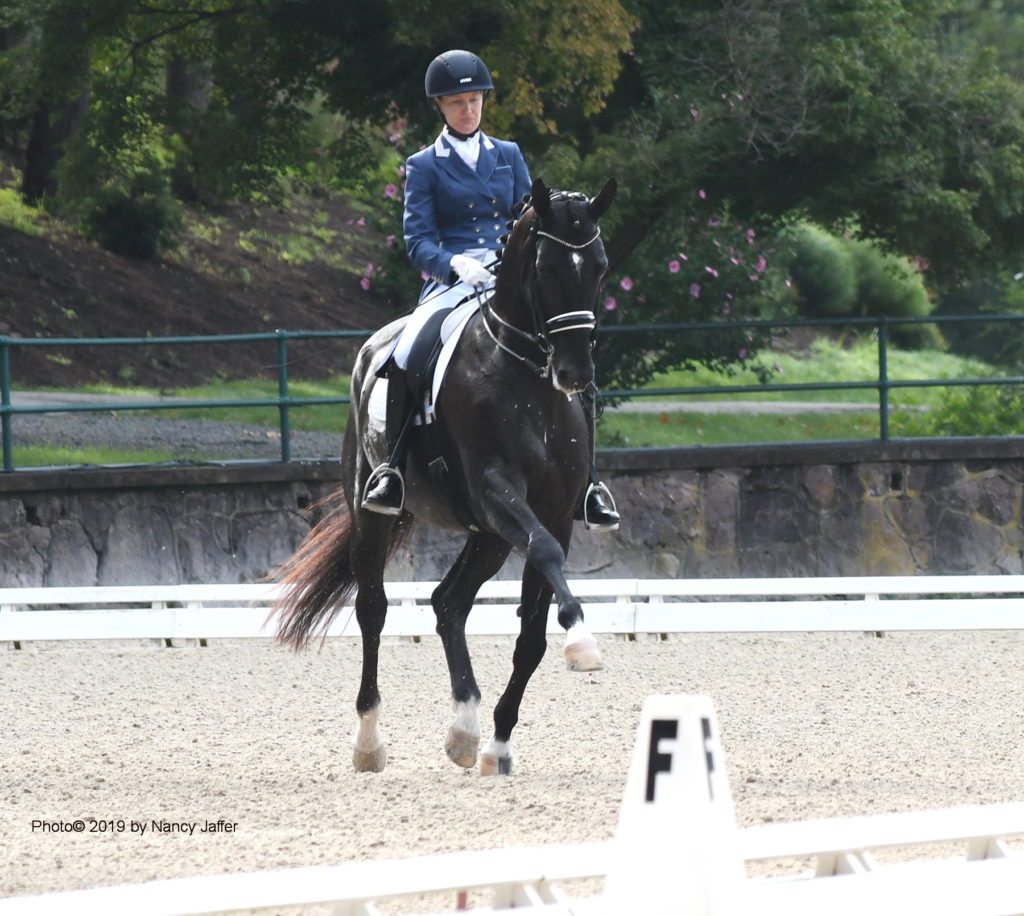
Alice and Candescent. (Photo © by Nancy Jaffer)
“As soon as she came off the plane and left quarantine, it was like, `Oh my gosh, the horse is a freak.’ She’s super scopey.”
Seven years later, Alice and Candescent have been put on the short list for the U.S. Olympic squad in their discipline.
A total of 12 riders were named with 15 horses. They include Adrienne Lyle with Salvino, number one in the standings (Adrienne was also named with Harmony’s Duval); multi-medalist Steffen Peters and Suppenkasper, number two; and Olivia Lagoy-Weltz with Lonoir, a prospect she trained up from Third Level. Others on the list are,Sabine Schut-Kery and Sanceo, who, like Candescent, is a horse the rider has brought along through the ranks and Nick Wagnman, who has two horses on the roster, Don John and Ferano.
Candescent was ranked number 13, and with Alice, is number 395 in the FEI (international equestrian federation) standings, having made a huge leap up the ladder from number 545 last month. See, Candescent can jump after all!
While Alice is under no illusions that she’ll be heading for Tokyo to ride with the flag on her saddle pad, there are plenty of big competitions on the horizon to point toward, including the world championships in Denmark next year and the Paris Olympics in 2024. Meanwhile, she’s looking forward to the mandatory outing for the short list riders in June at the Palm Beach International Equestrian Club in Wellington, Fla.
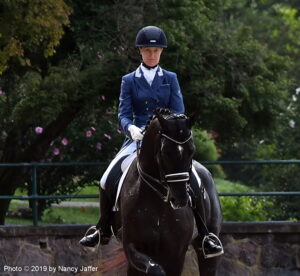
Alice and Candescent have established a close relationship during years of training. (Photo © 2021 by Nancy Jaffer)
“It’s definitely fun to have made the list. What an honor to be listed with all those people. Almost everyone on that list is a team rider,” noted Alice, who has never been on a team.
Candescent’s selection is a tribute to her owner’s patience and skill, since she is “not so easy to bring along. She’s a special one, I’ll say that,” Alice noted.
“She’s a bull on the ground, she’s a bull under saddle. They call her `the monster horse’ for a reason. She has no respect for people or anything basically,” Alice recounted.
“She just does what she wants.”
When Alice first saw the mare on the video, she was intrigued. Candescent is by Christ 3, who has produced jumpers as well as dressage horses.
“I wanted a horse that was black with four white socks,” explained the Oldwick resident, “and it’s not easy to find a jumper that is black with four white socks. Her immediate thought was, “Maybe it could jump.”
The mare’s coloring is a throwback to Alice’s childhood pony, Licorice, black with four white socks, and so she has a fleet of black horses with white socks, as we’ve recounted her fixation here previously.
Candescent’s talent has been impressively on display for several years. In 2018, Candescent and Alice won both the amateur Intermediate A and B competitions during Dressage at Devon, then went on to take the A and B classes at Devon the next year.
In 2019, Candescent had three straight victories in the U.S. Dressage Federation Championships in the amateur grand prix category. She won the USEF Grand Prix National Championship in Illinois last year, and this year, highlights included a win in the Grand Prix Special in Wellington last month.
Candescent missed an April outing at the new World Equestrian Center in Ocala when she sustained a cut requiring stitches in a trailer mishap, but Alice had planned to rest her for a while anyway. She’s back home in New Jersey now, before heading for Florida again.
Alice is looking forward to the mandatory short list outing, and competing under the lights in a new venue. During the Florida season, the horses show at the Global grounds, about a half-mile from PBIEC. Happily, Candescent isn’t put off by a new location.
“She doesn’t get bothered by a lot,” said Alice, who works with trainer Marcus Orlob of Annandale.
“It will be fun to do, and interesting to see how it plays out.”
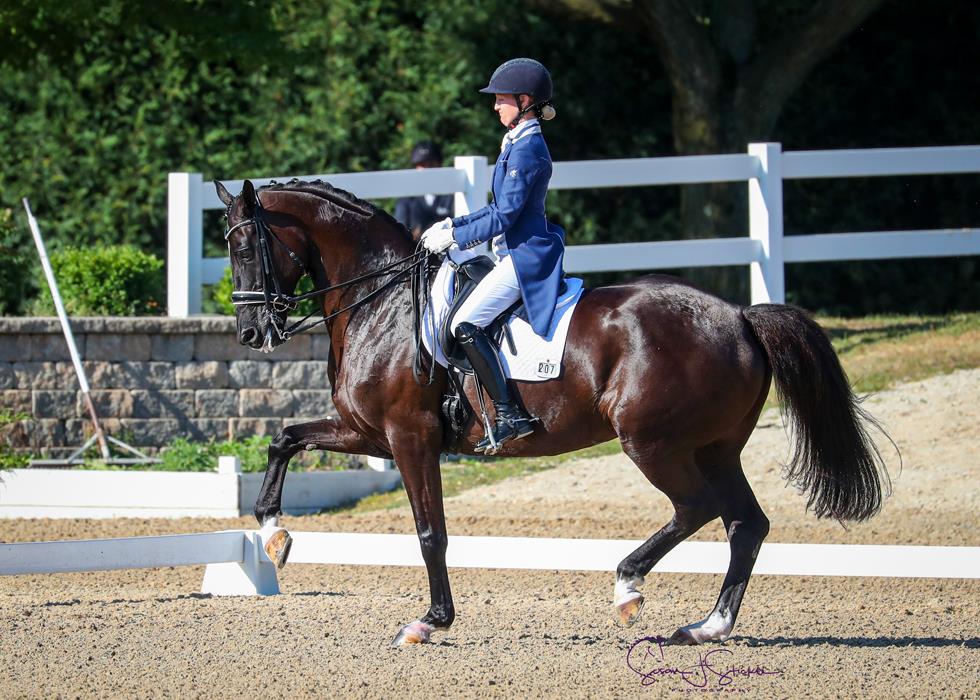
Candescent at the dressage championships. (Photo by Susan J. Stickle)
Alice was intrigued by the fact that she was a member of the Somerset Hills Pony Club when she was growing up, as was Devin Ryan, the only New Jerseyan on the Olympic show jumping shortlist, where he was named with Eddie Blue. Now Alice is waiting to see if Doug Payne, who also belonged to the club and used to help her with Licorice, will be named to the Olympic eventing short list. He was 12th at the Land Rover Kentucky 5-star last weekend with Vandiver, but the fifth-best American (foreign riders filled seven spots in the top 12.)
While Kentucky was a U.S. Olympic selection trial, there’s one more test in that category before the short list is named. It’s the Jersey Fresh International Horse Trials, which gets under way Thursday at the Horse Park of New Jersey in Allentown. Read more on this website in the story below, or at this link.
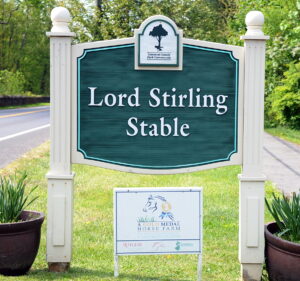
by Nancy Jaffer | Apr 23, 2021
As an advisory group considers the future for the Somerset County Park Commission’s Lord Stirling Stable, which stopped offering riding lessons when the pandemic began, a survey was sent out to aid in developing a strategic plan for reopening the facility in Basking Ridge.
The mailing list included those who have utilized Somerset County park services, so feedback is coming not only from Somerset County residents, but also from those outside the area. The general public also had a chance to participate..
The Park Commission is interested in increasing activities at the park on the edge of the Great Swamp, where the stable is set on 450 acres that includes 14 miles of trails. Among a variety of questions, the survey asked what type of activities respondents participated in at Lord Stirling, from riding lessons, hunter paces and trail rides to dog walks, pony rides and special community events.
It also sought answers to what non-equestrian activities interest respondents, including snowshoeing and cross-country skiing, nature walks and bird watching. It solicited suggestions for other activities, as well asking respondents to rate what Lord Stirling previously offered, in terms of quality of riding instruction and choice of horses, as well as the park’s atmosphere. The committee also wanted to know what the primary reason for coming to Lord Stirling in the future would be for potential visitors, including horse activities, non-riding activities or new services.
“Lord Stirling Stable has been a crown jewel of the Somerset County Park Commission for more than 50 years, and we are committed to maximizing its benefits to our visitors while protecting its environmental sensitivity and diversity,” said Somerset County Park Commission President Mark Caliguire. “This survey and the input from the public will help us determine how to improve our current programs and expand permissible uses of the property for the residents of Somerset County and their guests.”
Although there was discussion at one time of reopening the stable to the public for lessons this year, there are only limited activities during 2021, including boarding more than two dozen private horses and organized dog walks.
Geoff Soriano, the commission’s executive director, noted the road to reopening involves a lengthy process. The advisory committee meets every two weeks, while its sub-groups get together more frequently to explore different aspects of the panel’s mission in depth. Research includes visit to other county stables around the state.
Once a business plan is developed and reviewed by the park commission, it goes to the county commissioners for approval. Additional funding may be needed to buy horses (the lesson horses were sold last year), and a stable manager will have to be hired. The process, Geoff advised, “could take some time.”
He noted, “The goal has been to get the stable back up into a programmatic mode by January 2022. What is the right time to really launch this new and exciting stable, this re-do? Should it be in the doldrums of winter or should we wait until in the spring? This is not something anybody has decided, yet it’s an idea that’s out there. Within those parameters, that’s kind of the goal.”
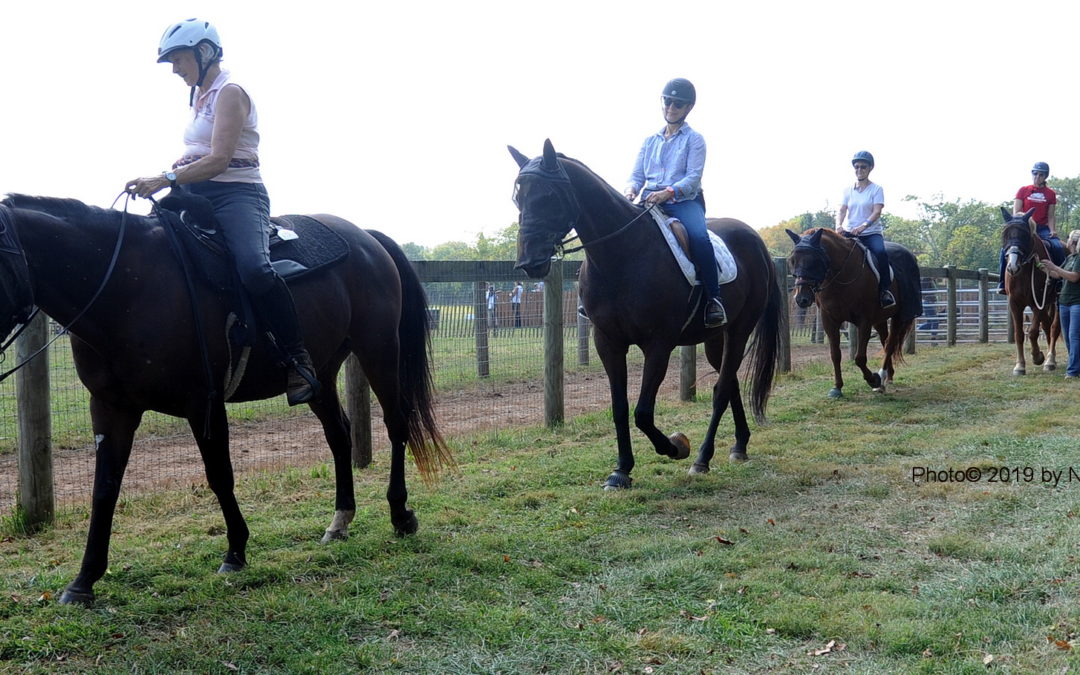
by Nancy Jaffer | Apr 22, 2021
As an advisory group considers the future for the Somerset County Park Commission’s Lord Stirling Stable, which stopped offering riding lessons when the pandemic began, a survey has been sent out to aid in developing a strategic plan for reopening the facility in Basking Ridge.
The mailing list includes those who have utilized Somerset County park services, so feedback is coming not only from Somerset County residents, but also from those outside the area. The general public has a chance to participate as well through tomorrow, via social media and this link.
The Park Commission is interested in increasing activities at the park on the edge of the Great Swamp, where the stable is set on 450 acres that includes 14 miles of trails. Among a variety of questions, the survey asks what type of activities respondents participated in at Lord Stirling, from riding lessons, hunter paces and trail rides to dog walks, pony rides and special community events.
It also seeks answers to what non-equestrian activities interest respondents, including snowshoeing and cross-country skiing, nature walks and bird watching. It solicits suggestions for other activities, as well asking respondents to rate what Lord Stirling previously offered, in terms of quality of riding instruction and choice of horses, as well as the park’s atmosphere. The committee also wants to know what the primary reason for coming to Lord Stirling in the future would be for potential visitors, including horse activities, non-riding activities or new services.
“Lord Stirling Stable has been a crown jewel of the Somerset County Park Commission for more than 50 years, and we are committed to maximizing its benefits to our visitors while protecting its environmental sensitivity and diversity,” said Somerset County Park Commission President Mark Caliguire. “This survey and the input from the public will help us determine how to improve our current programs and expand permissible uses of the property for the residents of Somerset County and their guests.”
Although there was discussion at one time of reopening the stable to the public for lessons this year, there are only limited activities during 2021, including boarding more than two dozen private horses and organized dog walks.
Geoff Soriano, the commission’s executive director, noted the road to reopening involves a lengthy process. The advisory committee meets every two weeks, while its sub-groups get together more frequently to explore different aspects of the panel’s mission in depth. Research includes visit to other county stables around the state.
Once the business plan is developed and reviewed by the park commission, it goes to the county commissioners for approval. Additional funding may be needed to buy horses (the lesson horses were sold last year), and a stable manager will have to be hired. The process, Geoff advised, “could take some time.”
He noted, “The goal has been to get the stable back up into a programmatic mode by January 2022. What is the right time to really launch this new and exciting stable, this re-do? Should it be in the doldrums of winter or should we wait until in the spring? This is not something anybody has decided, yet it’s an idea that’s out there. Within those parameters, that’s kind of the goal.”
by Nancy Jaffer | Apr 16, 2021
The Land Rover Kentucky Three-Day Event Presented by MARS Equestrian™ is presenting its “Behind the Barn” series
of Interviews with top eventers starting April 18.
The event is running without spectators, but it is available on line, and the interviews are a good supplement to the live action April 22-25 at the Kentucky Horse Park in Lexington.
“This will be a chance to hear some of the biggest names in equestrian sport reveal what inspires them and what they hope to accomplish as they prepare for this year’s event,” said Lee Carter, executive director of Equestrian Events Inc., which presents the event, featuring 5-star Long and 4-star Short divisions.
“In many ways, this will give fans of our event an up-close look at our sport’s leading competitors beyond anything they could experience in person. We think everyone will be touched by some of the previously private stories they’ll hear.”
The event, the country’s premier three-day event, is a U.S. selection trial for this summer’s Tokyo Olympic Games eventing team. A new partnership between EEI and the Kentucky Horse Park Foundation, combined with the support of US Equestrian (USEF), longstanding sponsors Land Rover, MARS Equestrian™ and Rolex and many other valued event sponsors, plus the collective efforts of the many individuals who donated, ensured that the nation’s premier equestrian event will be held with its traditional CCI5*-L in the afternoons and a new CCI4*-S in the mornings. Although the event is being held without spectators, it can be seen live online, free of charge, on the USEF Network.
The “Behind The Barn” interviews are hosted by veteran TV personality and three-day event rider Frankie Thieriot Stutes. The interviews will premiere on the event’s website and social media pages (Facebook and Instagram) as follows:
1. Sunday, April 18 – Liz Halliday-Sharp
2. Sunday, April 18 – Emilee Libby
3. Monday, April 19 – Derek DiGrazia
4. Monday, April 19 – Daniela Moguel
5. Monday, April 19 – Lauren Kieffer Nicholson and Jo Kieffer
6. Tuesday, April 20 – Tim and Jonelle Price
7. Tuesday, April 20 – Erik Duvander
8. Tuesday, April 20 – Buck Davidson
9. Wednesday, April 21 – Will Faudree
10. Wednesday, April 21 – Allison Springer
11. Wednesday, April 21 – Boyd Martin and Phillip Dutton
12. Wednesday, April 21 – William Fox-Pitt
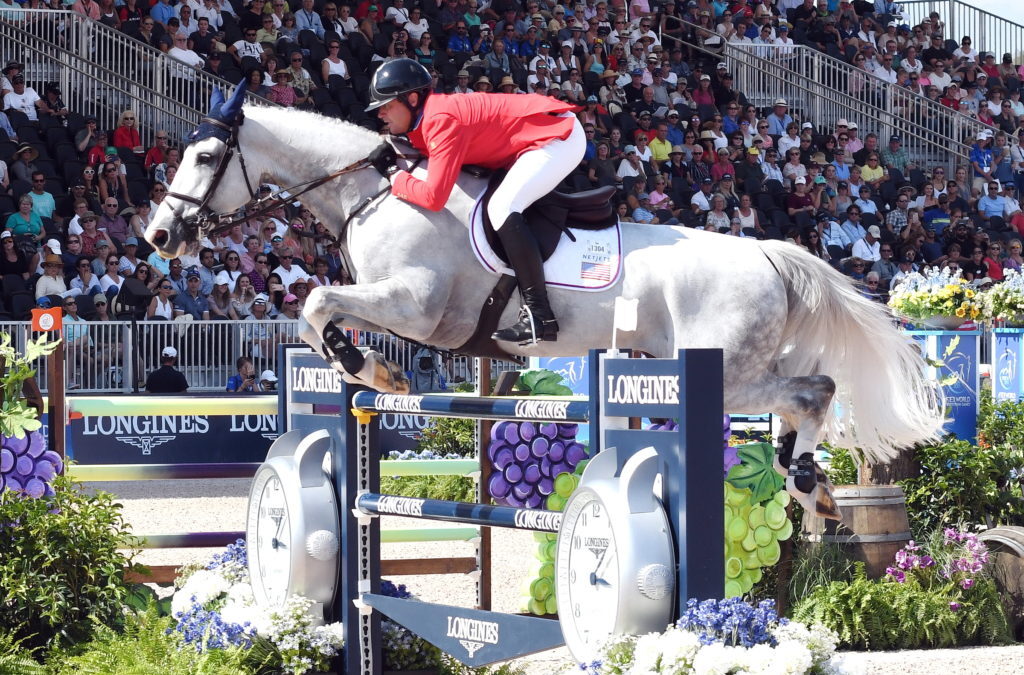
by Nancy Jaffer | Apr 15, 2021
Devin Ryan of Long Valley was chosen for the short list of 10 show jumpers who are vying for spots on the U.S. Olympic team that will compete in Tokyo this summer. The group heads for Sopot, Poland and Rotterdam, Holland for Nations Cups and observation competitions before the final team of three and an alternate is named before July 5.
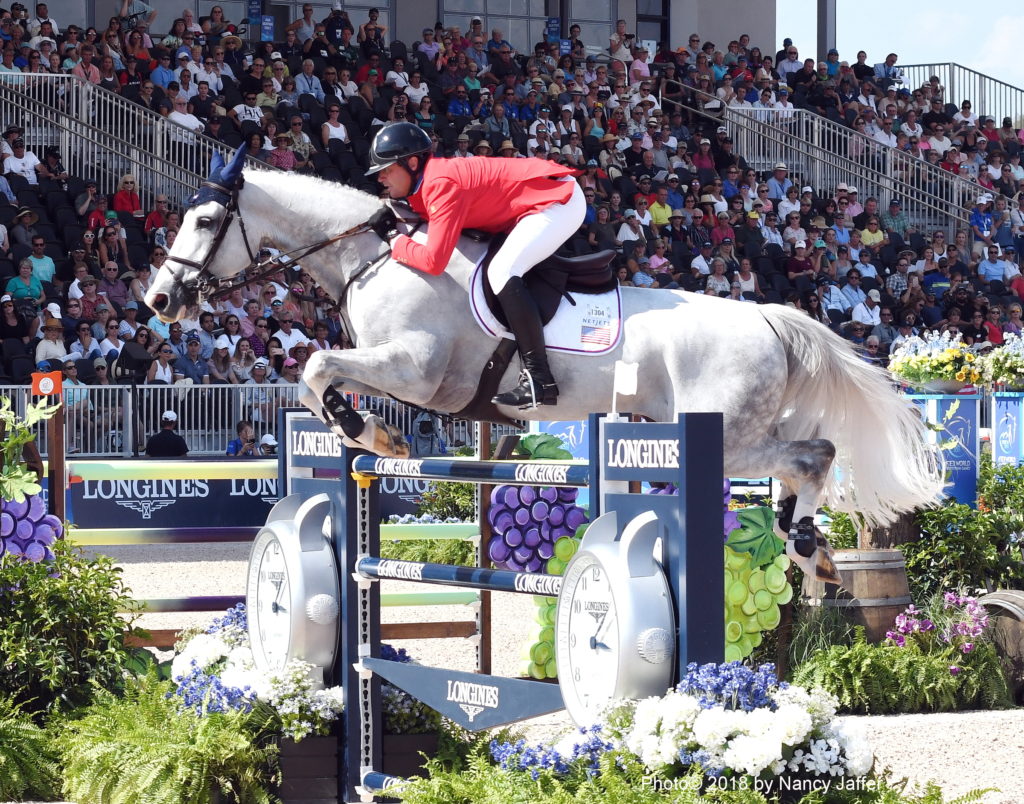
Devin Ryan and Eddie Blue jumping on the gold medal team at the 2018 FEI World Equestrian Games. (Photo © 2018 by Nancy Jaffer)
Devin and Eddie Blue, a 12-year-old Dutch warmblood he has been riding since the grey gelding was a 4-year-old, won the National Horse Show grand prix last year. They put themselves on the international map in a big way with a second place in the 2018 FEI Longines World Cup finals and were on the gold medal team at the 2018 FEI World Equestrian Games..
Another rider with New Jersey roots, Jessica Springsteen, was selected with Don Juan van de Donkhoeve, a 12-year-old Belgian Warmblood stallion owned by her family’s Stone Hill Farm in Colts Neck, and RMF Zecilie, a 14-year-old Holsteiner mare.
As expected, those making the list include Kent Farrington of Wellington, Fla., with Austria 2, a 13-year-old Holsteiner mare and his longtime partner Gazelle, a 15-year-old Belgian Warmblood mare. Others who come as no surprise are New Yorker McLain Ward with his 2017 FEI World Cup Finals winning mount, HH Azur, Contagious and Kasper van het Hellehof; and Beezie Madden of Cazenovia, N.Y., with three mounts owned by Abigail Wexner– Breitling LS, Chic Hin D Hyrencourt and Garant. Laura Kraut, another Florida resident who rode on the 2008 Olympic gold medal team with Beezie and McLain, is listed with Confu, Goldwin and Baloutinue.
The list also includes Texan Brian Moggre, who won the Dover Saddlery/USEF Medal Finals as a junior. He was named with Balou du Reventon, and MTM Vivre Le Reve, the mount on which he became the youngest rider ever to win the National Horse Show Grand Prix. Others are Lucy Deslauriers of New York and Hester, Bliss Heers (Las Vegas) and Antidote de Mars, Adrienne Sternlicht of Connecticut with Bennys Legacy; Cristalline, her ride on the 2018 FEI World Equestrian Games gold medal team and Just a Gamble.
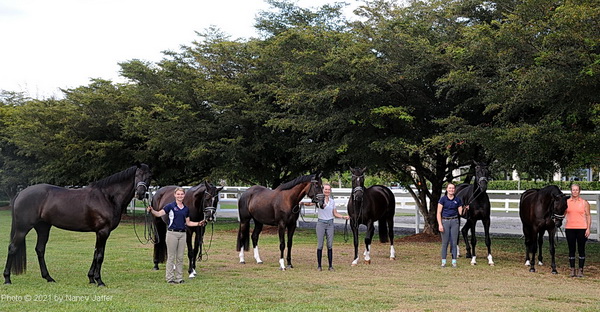
by Nancy Jaffer | Apr 4, 2021
It all started with Licorice, a black pony with four white socks who tactfully could best be described as “a brat.”
But he provided quite a legacy for Alice Tarjan, who figured out how to ride him well enough so he would do what she wanted, rather than grabbing the bit and running out of the ring during Pony Club lessons. It’s not only what the Oldwick resident learned from coping with him that started her on the path to success in the dressage world; apparently, he also imprinted her, since his coloring is closely replicated in eight of her current horses.
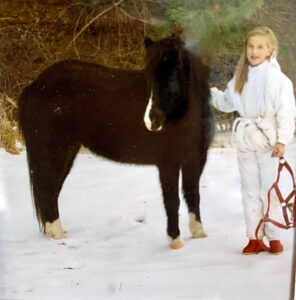
Alice as a child with the infamous Licorice, who set the color palette for many of her horses. (Photo courtesy of Alice Tarjan)
“My favorite is black with white socks, no question,” she conceded. “It’s pretty.
The 41-year-old amateur rider generally buys her future mounts off videos; she has the ability to see potential in youngsters, then is able to bring out their best with dedicated effort and training. Three of them were stars as the Adequan Global Dressage Festival closed its run in Wellington, Fla., today. In addition to happiness, the emotions Alice felt included “huge relief” at the end of a long weekend as she saw her work pay off.
Candescent, black with four white socks, gave Alice her first Big Tour FEI victory with a 72.702 percent mark in Friday’s 3-star Grand Prix Special. The 11-year-old Hanoverian mare was last year’s Developing Grand Prix Champion.
“It’s been fun bringing her along, but the horse is a bit of a monster,” Alice said after her victory.
“She’s super cool and a lot of fun, but she is funny, because she’s hot and cold all at once, so it’s been a bit of a challenge to get her trained to this level and then to get it to be a bit more harmonious.”
Today, Alice won the Lövsta Future Challenge Grand Prix with the 8-year-old Hanoverian mare Serenade (two white socks and an anklet) on an impressive 76.008 percent, with a bevy of 9s for passage. Serenade was the national 4-year-old champion early in her career. While most of Alice’s horses were foaled abroad, Serenade, purchased by Alice as a foal, was bred in North Carolina by Maryanna Haymon.
During Saturday’s warm-up, Serenade was second to stablemate Harvest (a 9-year-old Hanoverian stallion with similar markings) who got a 10 for his final halt that day and a score of 76.911. Harvest, who is on the U.S. Equestrian Federation’s Developing list like four other of Alice’s horses, was second today and second last year in the national Developing Grand Prix championship. Alice trains with another New Jersey rider, Marcus Orlob of Annandale, who had his own victory today in the Future Challenge/Young Horse Prix St. Georges Final aboard Spirit of Joy, a 7-year-old Westphalen gelding he owns with Jeannette Pinard.
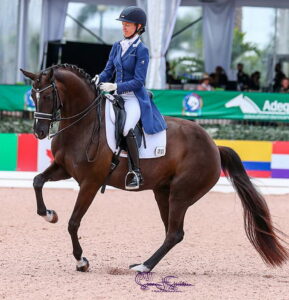
Alice Tarjan and Serenade MF. (Photo by Susan J. Stickle)
“It was certainly a good weekend, we’re happy,” Alice said after collecting her ribbons and accolades, but typical of her usual businesslike push toward perfection, she noted, “We have a lot of homework to do.”
A big plus this weekend involved riding before panels of international judges, after years competing in national shows in front of one national judge.
“You don’t know what the CDI judges are going to give you,” Alice observed, “so it’s very exciting to get those kinds of scores. Now the real push is to try to ride a better test. You learn where the holes are and you try to improve them and try to ride better.”
Noting that European shows have been shut down through April 11 because of an EHV-1 problem that spread among horses after starting in Spain during the winter, she said, “We’re very lucky to be able to be here and have a show every day.”
Like the other riders at Florida shows, she is just grateful to be able to compete, even with Covid pandemic restrictions of mask-wearing and having temperatures taken on entering the grounds, along with mandatory social distancing. Her last show in Florida will be at the new World Equestrian Center in Ocala later this month before heading home.
She’s trying to qualify seven horses for the USEF national championships in Illinois, but realistically thinks six would be her limit to show comfortably. It’s always good to have a spare, of course, since things can go wrong. At the moment, Serenade is qualified for the Developing Grand Prix, she hopes Harvest can do it as well and Candescent is being pointed for the regular Grand Prix there. After that, she’s thinking of Dressage at Devon and the November U.S. Dressage Federation championships in Kentucky
When I was in Florida last month, we got six of Alice’s black horses to pose for a picture I had long wanted to take to show Licorice’s legacy.. We just didn’t have enough hands at the farm in Loxahatchee where Alice spends the winters to get all eight in, but it’s still an impressive shot.
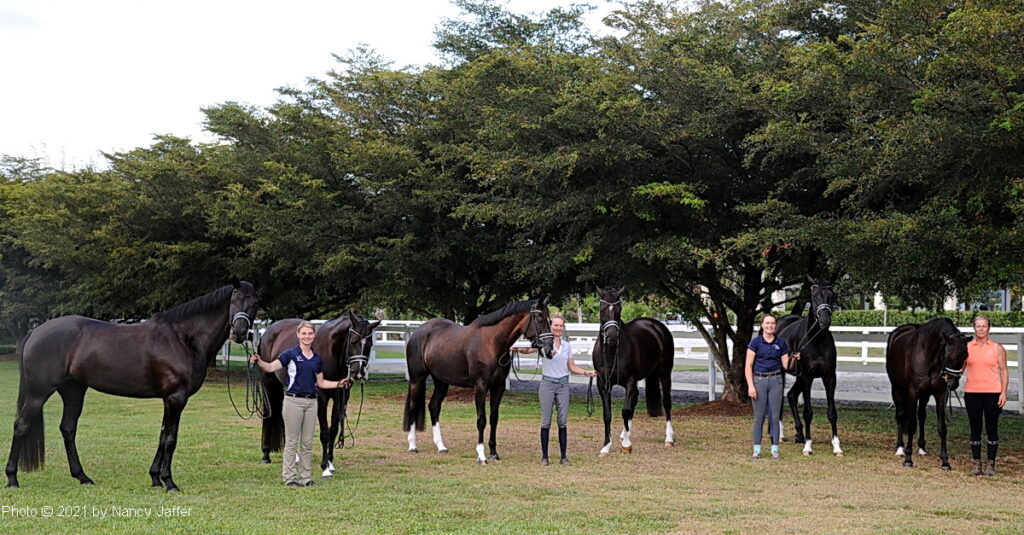
The color-coordinated lineup. (Photo © 2021 by Nancy Jaffer)
From the left, that’s stable manager Desiree Attland holding Donatella and Serenade. Alice is holding Ierland’s Eden and Jane, while Allison Nemeth has Summersby II and Niki Serge, a trainer based in Stockton who was working for Alice during the winter, is with Sliepner.
So here’s who they are: Donatella (she’s out of uniform, missing the white socks) won the Developing Grand Prix at the USEF championships last year and also took the 2020 Lövsta Future Challenge Grand Prix. The 10-year-old Oldenburg mare was bred in Maryland by Marnie Martin-Tucker; Alice bought her as a 4-year-old and she is now on the USEF’s Developing Horse list. Serenade was explained earlier in this story.
Eden is a 4-year-old Danish bred who showed in March at Loxahatchee’s White Fences, where she got an 87 in Materiale. Alice actually saw her “in person” when she bought her as a 2-year-old because she was visiting a breeder friend in Denmark. (She also bought a chestnut at that time; there are a few horses in her barn that don’t follow the Licorice model.) Jane was third in hand in the Dutch championships as a 3-year-old.
Summersby, bought from Germany as a foal, is now six. She was 3-year-old Materiale Horse of the Year and second in the national championships as both a 4- and 5-year old.
Sliepner is a 5-year-old purchased from Holland as a 3-year-old and doesn’t have anything on her resume yet. Candescent and Glory Day, who is ridden by Marcus, didn’t make the photo shoot.
Alice, who only buys mares and stallions, says her goal “has been to be able to have a barn full of solid Grand Prix horses. I like training them and giving them an education. I like to figure out how to ride a Grand Prix test a little better. The majority of these horses will be sold at some point and they can share their knowledge with somebody else. It will be nice to watch somebody else compete them and do well with them. I don’t have to be the one doing it.”
by Nancy Jaffer | Mar 29, 2021
Top-level show jumping in the Sunshine State has overcome the pandemic and EHV-1. The impressive evidence is the turnout for the biggest grands prix in Wellington and Ocala last weekend. With a total of $1,700,000 offered at three venues in the state, 148 horses started in three major classes.
HITS Ocala hosted the richest of the competitions, the Great American $1 million Grand Prix. It was won by Germany’s Andre Thieme–who has topped HITS $1 million classes on three previous occasions–proving it’s a habit by taking the $350,000 first prize on Chakaria. The $1 million was the largest of the three grands prix, as befitting the amount of the purse, with 61 on the order of go.
As Andre noted about his affinity for the Hits Million, It’s my goal every year and while I’m not giving away other classes, I definitely don’t put as much effort toward some of the other classes, I try to really produce my horses for this class every single time. I try to be sure that everything on the day of this class goes perfect, because this is the class that I really want to win each year.”
Bernardo Cabral said of the course he designed for the class, “I didn’t make it overly big but it was technical and I thought asked a lot of questions to the riders, but also left an easy way out for the horses if there was a mistake by the pilot.”
At the nearby World Equestrian Center, the $200,000 Lugano Diamonds Grand Prix went to the only U.S. winner of the weekend’s major classes, Aaron Vale, with Candro van de Zuuthoeve. There were 47 on that entry list.
In Wellington, the $500,000 Rolex Grand Prix held on the grass field at the Equestrian Village, was dominated by another German, Daniel Deusser, with 1918 Scuderia Tobago Z. Daniel has been a consistent victor throughout the Winter Equestrian Festival series this season.
The highest-placed U.S. rider among 40 in that class was McLain Ward, fourth with Catoki, who had a rail in the jump-off. McLAin also was the highest-placed U.S. rider in the HITS Million, fourth with HH Azur and a rail.
by Nancy Jaffer | Mar 24, 2021
The National Professional Horsemen’s Association Medal Finals will be a highlight of this summer’s Monmouth at the Team show, which is being moved from the U.S. Equestrian Team Foundation in Gladstone to the Centenary University Equestrian Center in Long Valley.
With the new multi-ring location, the show that runs Aug. 16-23 will have a number of different offerings, including A-rated hunters, than it did at the one-ring Gladstone venue. The PHA Medal finals will be held Aug. 18. Scott Fitton, a U.S. Equestrian Federation “R” hunter and hunter seat equitation judge, will officiate. Skip Bailey will design the courses for Monmouth at the Team and for the National PHA Medal Finals, which will be a good prep for the fall indoor finals. The class for riders 21 and under will run over fences that are 3’3” and 3’6”, judged as one competition, with prizes presented to the top 10 riders.
“We are excited to be hosting the National PHA Medal Finals,” said Tucker Ericson, co-owner of Monmouth at the Team with his cousin, Michael Dowling.
“Adding this finals class to our show means so much, not only for our exhibitors, but also to the community of horsemen we serve.”
Founded in 1936, the PHA is a benevolent organization of volunteer horsemen helping horsemen. The PHA gives aid and sustenance to needy horsemen, provides financial assistance for continuing education to children of professional members. PHA promotes interest in the horse industry and fosters the care and protection of horses through education. This year, the PHA will support Danny and Ron’s Rescue in their efforts to rehome dogs. Each time a rider participates in a PHA medal class throughout the year, a portion of their entry will go to support Danny and Ron’s Rescue.
“The National PHA Medal and Monmouth at the Team horse show both have long, rich histories,” said Lynn Peters, PHA recording secretary. “They honor the past while inviting today’s horsemen to help write the next chapter of their distinguished story. We are thrilled to be a part of this extraordinary show and look forward to a successful future together.”
Longtime sponsor and friend of Monmouth at the Team, Mountain Pointe Equine Veterinary Services, will host a safe, socially distanced cocktail reception during the finals.
by Nancy Jaffer | Mar 23, 2021
Furlong’s Healthy Horse virtual seminar, presented by B.W. Furlong Associates will host a presentation by Dr Aja Harvey Wednesday March 24 at 6:30 p.m. The topic is information about theEHV-1 virus and biosecurity recommendations to keep your horses safe. Don’t forget this virus has shut down shows in Europe through April 11. Click on this link to join the session. Or go to B.W. Furlong Associates Facebook page for the livestream.















